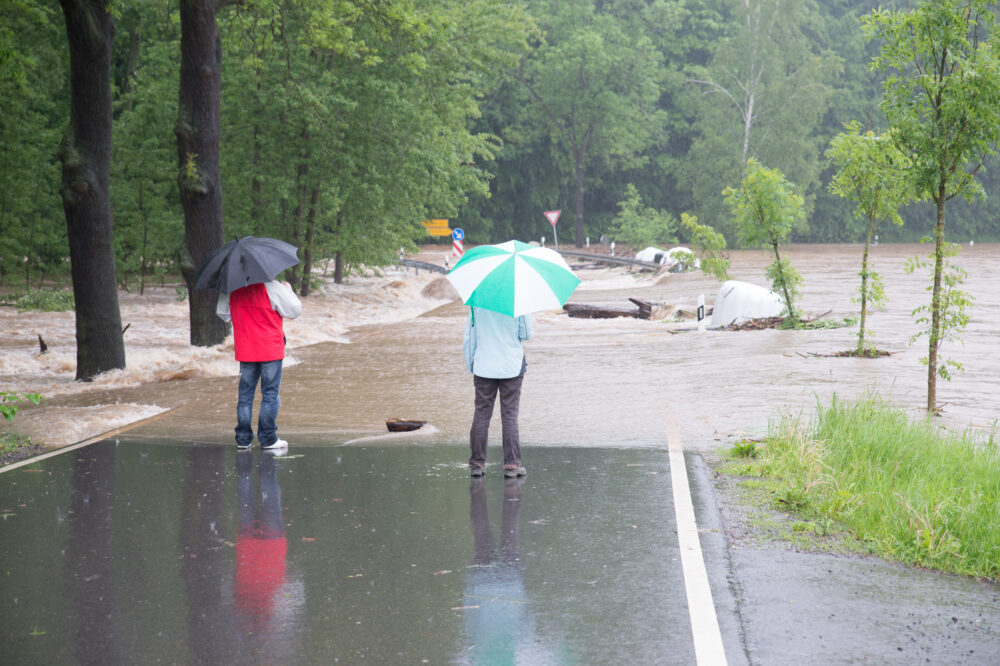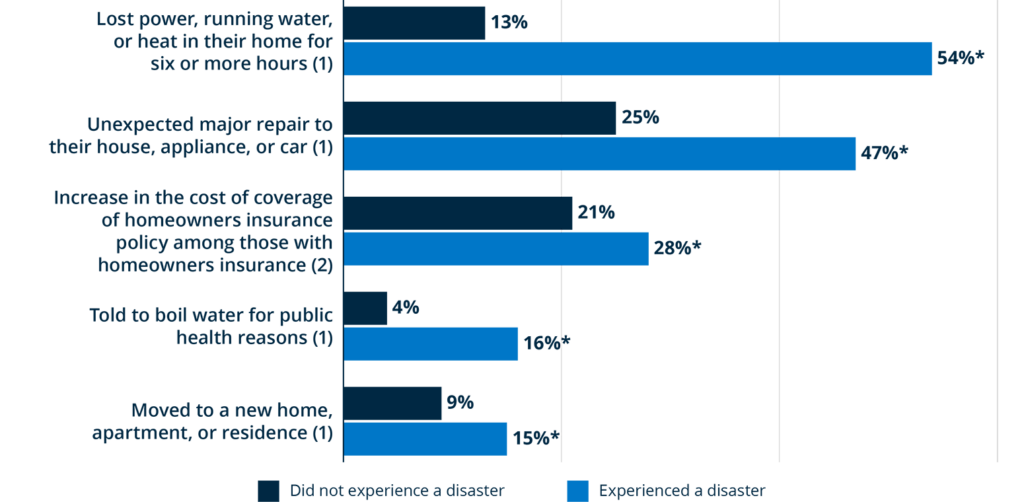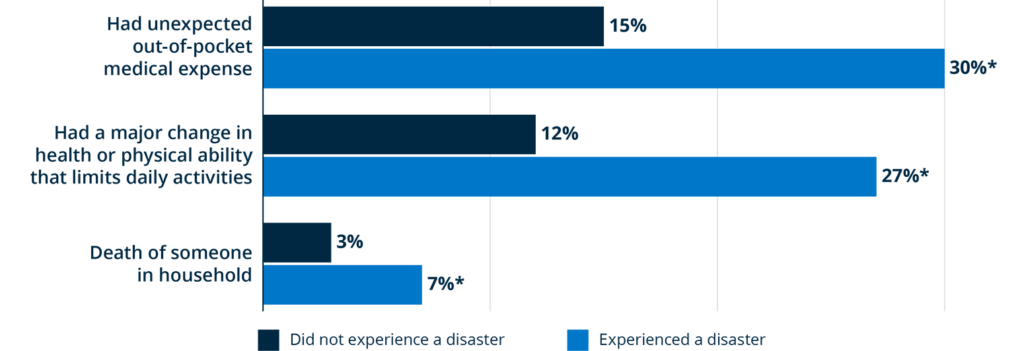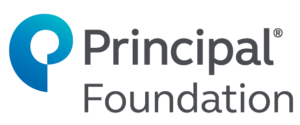Exploring the Link Between Housing and Healthcare Costs and Weather Events
Households that experienced a weather event were also more likely to face a range of unexpected housing- and health-related expenses.
By Kennan Cepa, Ph.D., Wanjira Chege
-
Program:
-
Category:

According to Financial Health Pulse® data collected by the Financial Health Network from April through June 2024, an estimated 9.47 million U.S. households reported that they experienced a natural disaster or severe weather event in the past year, such as a wildfire, hurricane, flood, extreme temperatures, or other natural event.1, 2, 3
Which Households More Frequently Experienced a Weather Event in the Past Year?
Households that experienced a natural disaster or severe weather event in the past year more often reported a negative net worth or that they would break even when asked to add their assets and debts. They less frequently reported having money left over. Households that experienced a weather event more often lived in rural areas and Southern states, but were less frequently found in Western states. These households were more often headed by someone aged 25 to 54 but were less often headed by someone 55 or older.4 Households that experienced a disaster less frequently identified as Latinx and more often reported having a disability. There were no meaningful differences in household income or residential insurance coverage.
Given this variability in who reported a natural disaster or weather event, we control for these household characteristics in our analyses.
Over half (57%) of those who experienced a weather event in the past year reported that their household expenses increased in the past 12 months, compared with 40% of households that had not experienced a disaster in the past year, even when we controlled for a number of background characteristics, including household income, net worth, residential insurance coverage, race and ethnicity, region, urbanicity, and age.5
Household expenses can increase because of financial shocks, which include unexpected expenses like moving costs or an unanticipated medical bill, that a household has to manage in addition to its regular budget.6 Sometimes, these financial shocks can be triggered by a natural disaster or weather event.7, 8, 9, 10
When asked about five different types of housing-related financial shocks, households that had lived through a weather event in the past year more often reported experiencing each of these five shocks, even when controlling for household income, net worth, residential insurance coverage, race and ethnicity, region, urbanicity, and age (Figure 1). Although our data isn’t causal, our findings confirm prior research showing that households that experienced a natural disaster can face property damage or may need to move to a new home, apartment, or residence.11
Figure 1. Households that experienced a weather event in the past year more often experience a housing-related financial shock.
Percentage of households that experienced a housing-related financial shock, by whether they experienced a weather event in the past year.

Note: * Statistically significant relative to those who did not experience a disaster (at p < 0.05). All findings are significant when we control for household income, net worth, residential insurance coverage, race and ethnicity, region, urbanicity, and age. Data from 2024 Financial Health Pulse® survey.
(1): N = 6,669, comprising households for whom we have complete information on race, age, net worth, income, residential insurance coverage, census region, and county or Metropolitan Statistical Area (MSA) of residence, and who responded to the eight financial health indicator questions.
(2): For our analysis of the cost of homeowners insurance coverage, we further limit the sample to homeowners with homeowners insurance, which has a sample size of 4,306.
We also investigate additional housing-related shocks that are not as commonly studied, but can still generate costs for households. For instance, utility disruptions or boil water notices can generate expenses such as needing to purchase bottled water or replace spoiled food. These shocks were more commonly reported by households who had experienced a weather event in the past year, with over half (54%) indicating that they lost power, running water, or heat in their home for six or more hours. While being told to boil water for public health reasons was less common, those who had experienced a natural disaster in the past year reported this housing-related shock four times as often as households that had not experienced a weather event (16% vs. 4%).
In addition, insurance providers may increase the cost of coverage for those who experienced a recent weather event.12 Our findings confirm that an increase in the cost of homeowners insurance coverage was more commonly reported by households that had experienced a weather event in the past year (28% vs. 21%). This raises concerns that consumers may drop their insurance or seek out lower-cost plans with less coverage in an attempt to manage household expenses, especially since prior Financial Health Network research shows that cost may be a barrier to carrying residential insurance.13
Housing shocks are not the only type of unexpected expense that households face in the aftermath of a disaster. Unanticipated health-related costs are also cause for concern. Previous work has hypothesized that weather events – including hurricanes, extreme heat, flooding, and wildfires – can exacerbate existing health issues and lead to new injuries, physical and mental health concerns, or even death.14, 15, 16 Other work has estimated the considerable health-related costs that can be attributed to specific weather events.17
Pulse data indicated that three specific health-related shocks were reported at least twice as often by those who also experienced a weather event in the last 12 months, even after taking into account household income, net worth, residential insurance coverage, race and ethnicity, region, urbanicity, and age (Figure 2).
Figure 2. Households that experienced a weather event in the past year experienced three health-related financial shocks at least twice as often as other households.
Percentage of households that experienced a health-related financial shock, by whether they experienced a weather event in the past year.

Note: * Statistically significant relative to those who did not experience a disaster (at p <0.05). All findings are significant when we control for household income, net worth, residential insurance coverage, race and ethnicity, region, urbanicity, and age. Data from 2024 Financial Health Pulse® survey. N = 6,669 respondents for whom we have complete information on race, age, net worth, income, residential insurance coverage, census region, and county or Metropolitan Statistical Area (MSA) of residence, and who responded to the eight financial health indicator questions.
Having an unexpected out-of-pocket medical expense or a major change in health or physical ability that limits daily activities was reported by over a quarter of households that lived through a weather event in the past year (30% and 27%, respectively). And while rare, households that experienced a disaster in the past year reported a death in their households over twice as often as households that had not experienced a disaster (7% vs 3%).
“While it is possible that households that lived through a recent weather event were already more vulnerable to financial shocks, our findings point to the wide range of housing- and health-related expenses that might stem from a disaster, providing insight to stakeholders on how they might tailor their recovery efforts to help reduce affected households’ financial burdens.”
Methodology
Data from this study come from the Financial Health Pulse survey, which is supported by the Principal Foundation. Financial Health Pulse surveys are fielded using the probability-based Understanding America Study online panel, allowing the findings to be generalized to the civilian, noninstitutionalized, adult population of the United States. The 2024 Financial Health Pulse survey was fielded from April 16 through May 30, 2024, with 7,245 respondents and a cooperation rate of 65.67% with a margin of error of +/-1.15%.
For this study, we constructed a final sample of respondents who were homeowners or renters; for whom we have complete information on race, age, net worth, income, residential insurance coverage, census region, and county or Metropolitan Statistical Area (MSA) of residence; and who responded to the eight financial health indicator questions. As a result, we omitted 576 respondents with missing data, or 8% of the total sample, for a final analytic sample of 6,669 respondents.
About the Financial Health Pulse®
Since 2018, the Financial Health Network has conducted the Financial Health Pulse® research initiative. The Financial Health Pulse combines probability-based, longitudinal survey data with administrative data, with the goal of providing regular updates and actionable insights about the financial lives of Americans.
To see more of our Financial Health Pulse research, please visit our Pulse Research page.
- Calculated using 2023 ACS 1-Year Estimates of the number of U.S. households multiplied by the percentage of households (7.21%) who reported experiencing a weather event in the past 12 months in our 2024 Pulse survey.
- Estimates of U.S. households who reported that they experienced a disaster differ across studies. This may be due to variations in how the questions were framed and differences in the duration considered in our Pulse analysis compared to other research (“Economic Well-Being of U.S. Households in 2023,” Board of Governors of the Federal Reserve System, May 2024. “The Impact of Extreme Weather on Views About Climate Policy in the United States,” NPR, Robert Wood Johnson Foundation, & Harvard T.H. Chan School of Public Health, June 2022.).
- In this report, we use the terms “weather event” and “natural disaster” interchangeably.
- In this study, a household head refers to a randomly selected member of a household who reported that they were responsible for making financial decisions in their household.
- We used a logistic regression model with change in household expenses as a dependent variable, experiencing a weather event as a dichotomous independent variable, and household income, net worth, region, residential insurance coverage, race and ethnicity, urbanicity, and age as control variables.
- There is not a single, set definition for financial shocks, but this study follows closely in the steps of reporting from The Pew Charitable Trusts that defines a financial shock as “any expense or loss of income that households do not plan for when budgeting, regardless of the extent to which the shock may harm families financially.” See “The Role of Emergency Savings in Family Financial Security: How Do Families Cope With Financial Shocks?,” The Pew Charitable Trusts, October 2015. Similar definitions have been used in research conducted by the CFPB, which defined financial shocks as “the experience of a decline in income or an increase in expenses.” See Michal Grinstein-Weiss & Sam Bufe, “Financial Shocks and Financial Well-Being: Which Factors Help Build Financial Resiliency in Lower-Income Households?,” Washington University in St. Louis.
- “The Impact of Climate Change on American Household Finances,” U.S. Department of the Treasury.
- Harry Stevens, “Where heat waves might cause blackouts: Look up your area,” The Washington Post, May 2024.
- “Economic Well-Being of U.S. Households in 2023,” Board of Governors of the Federal Reserve System, May 2024.
- “The Downpour: Navigating Chronic Climate Expenses in Households Living on Low-to-Moderate Incomes,” SaverLife, November 2023.
- “Economic Well-Being of U.S. Households in 2023,” Board of Governors of the Federal Reserve System, May 2024.
- Brianna Sacks, “As wildfire risks intensify, California insurance rates keep rising,” The Washington Post, August 2024.
- Kennan Cepa, Wanjira Chege, & Angela Fontes, “Pulse Points Summer 2023: Weathering Financial Setbacks From Natural Disasters,” Financial Health Network, August 2023.
- John Balbus et al., “The Impacts of Climate Change on Human Health in the United States: A Scientific Assessment,” U.S. Global Change Research Program, 2016.
- “The Impact of Climate Change on American Household Finances,” U.S. Department of the Treasury.
- John Balbus et al., “The Impacts of Climate Change on Human Health in the United States: A Scientific Assessment,” U.S. Global Change Research Program, 2016.
- Vijay S. Limaye, Wendy Max, Juanita Constible, & Kim Knowlton, “Estimating the Health-Related Costs of 10 Climate-Sensitive U.S. Events During 2012,” GeoHealth, September 2019.
Acknowledgements
The authors thank David Silberman, Lisa Berdie, Heidi Johnson, and Lindsay Ferguson for their thoughtful review of this piece. The Financial Health Pulse is supported by the Principal Foundation. The findings, interpretations, and conclusions expressed in this piece are those of the Financial Health Network and do not necessarily represent those of our funders or partners.


